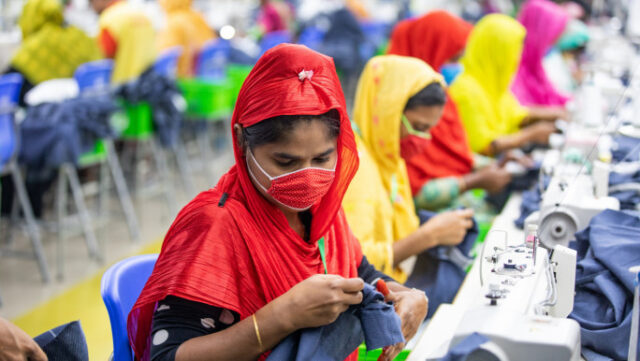H&M and a few other global brands have pledged to raise prices for apparel products sourced from Bangladesh. Yet, a lot more needs to be done to increase prices across the board. Manufacturers explain why their hands are tied when negotiating prices with intl buyers.
The company told its garment providers in Bangladesh that it would “absorb the increase of the wages in product prices,” after the government agreed to raise the minimum monthly wage by 56% to 12,500 taka ($113) in December.
On 26 November BGMEA president Faruqe Hassan confirmed to The Business Standard that four more brands also pledged to increase the price of their product, although he didn’t mention the names of the brands.
Dutch fashion brand G-Star Raw, meanwhile, committed to offsetting “any additional cost of our suppliers” during a recent interview with TBS.
In an interview given to Reuters on November 9, Stephen Lamar, chief executive of the American Apparel & Footwear Association (AAFA) also confirmed that they would raise the purchase price of their product.
Manufacturers in the country had feared the salary hike would eat into their profit margins as fashion retailers continue to pay the same prices for orders. Mohammad Hatem, Executive President of BKMEA lauded the these recent moves saying, “We appreciate H&M on their responsible buying practices. It would be great if other brands and fashion retailers also came forward with such support.”
Echoing him, Asif Ibrahim, a director of BGMEA said, “The commitment of H&M to increase their purchase price from Bangladesh is encouraging. It would be good if other global fashion retailers in Europe and North America also made such commitments. It will be further reassuring if the purchase price increase lasts beyond the upcoming season for price negotiations.”
In October, more than a dozen large fashion brands urged the government of Bangladesh to settle on a minimum wage that would cover garment workers’ basic needs, including some discretionary income and take into account the country’s persistently high inflation. The companies included Adidas, American Eagle Outfitters, Gap Inc, Hugo Boss, Levi Strauss & Co, Lululemon, Patagonia, Puma, Calvin Klein owner PVH Corp. and Under Armour.
None of them has publicly pledged to raise prices. In an interview given to Sourcing Journal, Mostafiz Uddin, managing director of Denim Expert, a denim manufacturer in Bangladesh said, “From my 25 years of experience in the clothing industry, I have never seen any buyers send a letter transparently and openly, except H&M.”
“This is the third occasion on which H&M has increased prices following an increase in the minimum wage. The company also did the same after previous minimum wage increases in 2013 and 2018,” he added.
Hatem informed that BKMEA and BGMEA officially sent joint letters to the buyers and fashion retailers to increase the prices, especially for the current orders. “The orders we have now are priced according to the previous salary range. So if they do not step forward to cooperate with us in this changing situation, it would be really difficult for the companies to continue,” he added.
According to Hatem, in the past when the worker’s salary was increased, the buyers were not ready to adjust the prices. Instead, they tried to lower the prices every season. Now that the international platforms are talking about sustainability and ethical and responsible buying practices, maybe they will come forward with a better price, he believes.
“Everyone is asking us about the workers’ situation in Bangladesh, but no one is holding the buyers responsible. We want the buyer’s participation so that they pay us a reasonable price. For example, if a brand sells a tee-shirt for $10, it pays us a maximum of $1 or $1.5 – only 10-15% of the retail price. If a brand buyer agrees to pay us 20-25% of what a consumer pays for the product, I will have no problem paying my workers more. They want compliance from us, but they are not ready to pay more,” he added.
In 2018 the workers demanded a raise in minimum wage, and it was increased. But back then the situation was not this bad; there were more orders, and international business conditions were better. Now the condition of RMG business is much more susceptible to international and local fluctuations.
“In this situation, if the buyers do not come forward, 80% of the factories will not be able to continue their business and pay the workers the current wage,” Hatem said.
“Workers are asking for Tk23 thousand, I have no problem paying them Tk25 thousand if I get the money from my buyers,” he said.
Price negotiations are done by individual manufacturers with their buyers and brands. But in the international market, if a brand or buyer does not like the price, they can easily look to some other factory in some other country, Hatem feared.
SOURCE: CLICK HERE

